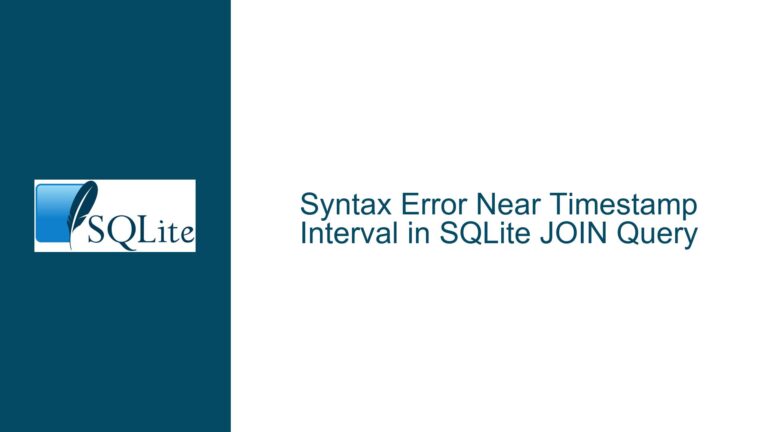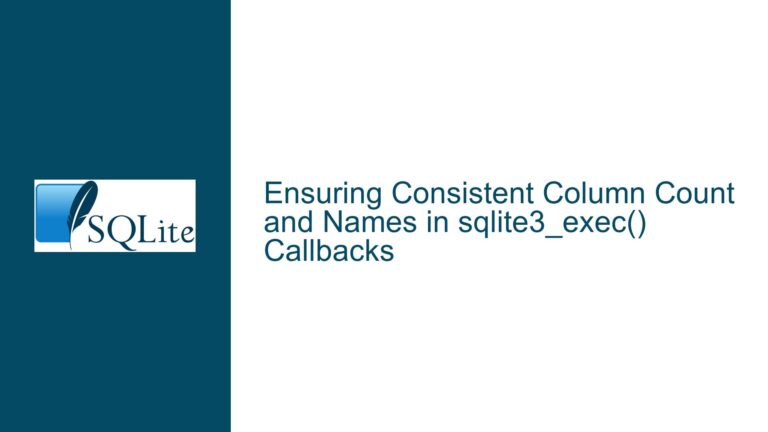Non-Deterministic Function Behavior in SQLite Joins
Issue Overview: Non-Deterministic Functions in Join Queries
The core issue revolves around the behavior of non-deterministic functions, specifically the random() function, within SQLite queries involving joins. The problem manifests when a query attempts to use the random() function directly in a join condition or a WHERE clause, leading to unexpected results. Specifically, the query:
SELECT a.value
FROM testtbl a
INNER JOIN testtbl b ON a.id = b.id
WHERE a.id = (abs(random()) % 1000 + 1);
fails to return any results, while functionally similar queries, such as:
SELECT a.value
FROM testtbl a
INNER JOIN testtbl b ON a.id = b.id
WHERE a.id = (SELECT abs(random()) % 1000 + 1);
or:
SELECT a.value
FROM testtbl a
WHERE a.id = (abs(random()) % 1000 + 1);
work as expected. This discrepancy arises due to how SQLite handles non-deterministic functions within the query execution plan, particularly in the context of joins and repeated evaluations.
The random() function in SQLite is non-deterministic, meaning that each call to it produces a different result. When used in a query, SQLite’s query planner must decide how to evaluate the function: either once (as in the case of a scalar subquery) or repeatedly (as in the case of a direct function call within a WHERE clause). The behavior of the query planner in these scenarios is influenced by the function’s determinism and the structure of the query.
Possible Causes: Query Planner Behavior and Non-Deterministic Functions
The root cause of the issue lies in the interaction between SQLite’s query planner and the non-deterministic nature of the random() function. Here are the key factors contributing to the problem:
Non-Deterministic Function Evaluation:
Therandom()function is marked as non-deterministic in SQLite, meaning that each call to it generates a new value. When used directly in aWHEREclause, SQLite evaluates the function for each row scanned during the query execution. This repeated evaluation leads to a situation where the value ofa.idis compared against a different random number for each row, drastically reducing the likelihood of a match.Query Planner Optimization:
SQLite’s query planner optimizes queries based on the structure of the query and the properties of the functions involved. In the case of a scalar subquery, such as(SELECT abs(random()) % 1000 + 1), the query planner evaluates the subquery once and reuses the result throughout the query. This ensures that the same random number is used for all comparisons, increasing the chances of a match.Join Execution Strategy:
When a join is involved, SQLite’s query planner may choose different execution strategies based on the query structure. In the problematic query, the join conditiona.id = b.idis evaluated alongside theWHEREclause conditiona.id = (abs(random()) % 1000 + 1). The query planner may decide to evaluate therandom()function for each row in the joined result set, leading to inconsistent comparisons and no matches.Implicit Assumptions About Randomness:
The issue is exacerbated by implicit assumptions about the behavior of therandom()function. Users may expect the function to produce a consistent value within a single query, but this is not the case for non-deterministic functions. The query planner’s behavior, while correct from a technical standpoint, can be counterintuitive for users who are not familiar with the nuances of non-deterministic function evaluation.
Troubleshooting Steps, Solutions & Fixes: Addressing Non-Deterministic Function Issues
To resolve the issue and ensure consistent behavior when using non-deterministic functions in SQLite queries, consider the following steps and solutions:
Use Scalar Subqueries for Consistent Evaluation:
To ensure that therandom()function is evaluated only once, wrap it in a scalar subquery. This forces SQLite to evaluate the function once and reuse the result throughout the query. For example:SELECT a.value FROM testtbl a INNER JOIN testtbl b ON a.id = b.id WHERE a.id = (SELECT abs(random()) % 1000 + 1);This approach guarantees that the same random number is used for all comparisons, increasing the likelihood of a match.
Materialize Random Values in a Common Table Expression (CTE):
Another approach is to materialize the random value in a CTE before using it in the main query. This ensures that the random value is generated once and reused consistently. For example:WITH random_value AS ( SELECT abs(random()) % 1000 + 1 AS rand_id ) SELECT a.value FROM testtbl a INNER JOIN testtbl b ON a.id = b.id INNER JOIN random_value r ON a.id = r.rand_id;This method provides greater control over the evaluation of non-deterministic functions and can be extended to more complex queries.
Avoid Non-Deterministic Functions in Join Conditions:
If possible, avoid using non-deterministic functions directly in join conditions orWHEREclauses. Instead, precompute the values and store them in a temporary table or variable. This approach eliminates the unpredictability associated with repeated function evaluations.Understand Query Planner Behavior:
Familiarize yourself with SQLite’s query planner and how it handles non-deterministic functions. Use theEXPLAIN QUERY PLANstatement to analyze the execution plan of your queries and identify potential issues. For example:EXPLAIN QUERY PLAN SELECT a.value FROM testtbl a INNER JOIN testtbl b ON a.id = b.id WHERE a.id = (abs(random()) % 1000 + 1);This can help you understand why the query planner is making certain decisions and guide you in optimizing your queries.
Consider Alternative Randomization Strategies:
If the use of non-deterministic functions is causing persistent issues, consider alternative randomization strategies. For example, you could precompute a list of random values and store them in a table, or use a deterministic function with a seed value to generate predictable random numbers.Leverage Deterministic Functions When Possible:
If your use case allows, consider using deterministic functions or precomputed values instead of non-deterministic functions. This ensures consistent behavior and eliminates the unpredictability associated with repeated evaluations.Test and Validate Query Behavior:
Thoroughly test and validate the behavior of your queries, especially when using non-deterministic functions. Use small datasets and controlled environments to isolate and understand the behavior of your queries before deploying them in production.
By following these steps and solutions, you can address the issues arising from the use of non-deterministic functions in SQLite queries and ensure consistent and predictable results. Understanding the nuances of SQLite’s query planner and function evaluation is key to writing efficient and reliable queries.






